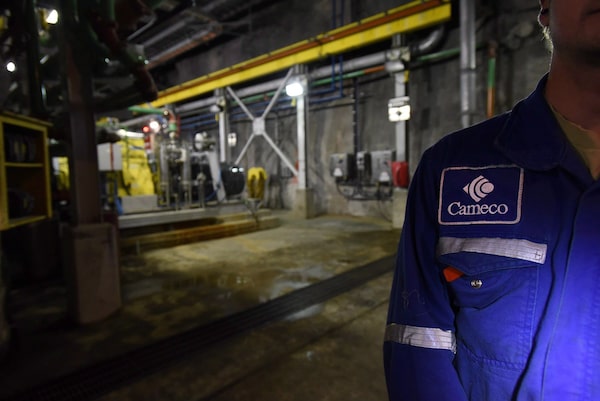
A Cameco media tour of the uranium mine in Cigar Lake, Sask., on Sept. 23, 2015.Liam Richards/The Canadian Press
In recent months, Cameco Corp. CCO-T chief executive Tim Gitzel began signalling that his company, one of the world’s largest uranium miners, planned a significant strategic shift.
In investor presentations, the Saskatoon-based CEO started dropping phrases such as “exploring opportunities” and “vertical integration across the fuel cycle” into sessions that previously focused on mine production and commodity prices.
Last week, Mr. Gitzel revealed what he was hinting at, as Cameco made a US$2.2-billion leap into servicing power companies by acquiring a stake in Westinghouse Electric Co., a move meant to capitalize on both the renaissance of nuclear power and Russia’s emergence as a pariah state.
Cameco partnered with Brookfield Renewable Partners LP to purchase one of the world’s largest nuclear-fuel-fabrication and reactor-servicing companies; Cameco will own 49 per cent of Westinghouse, Brookfield will hold 51 per cent. The pair are buying Westinghouse from Brookfield Business Partners LP, the private equity arm of Brookfield Asset Management Inc. BAM-A-T
Westinghouse currently counts half the world’s nuclear power generation companies as its customers, most locked into long-term contracts. Its major competitor is Moscow-based Rosatom.
Clients for the Russian state-owned company include utilities that run 42 Russian-built reactors in eight European and Asian countries, including Finland, Slovakia and the Czech Republic. Rosatom was also the prohibitive favourite to service 15 Russian-designed facilities under construction in eight countries, according to a study published in May by the Center on Global Energy Policy at Columbia University. Last year, Rosatom’s CEO forecast that the company would post US$140-billion in foreign sales over the next decade.
Then, Russian President Vladimir Putin launched an invasion of Ukraine, upending the global order. While Rosatom and other Russian energy businesses such as natural-gas exporters have avoided sanctions, to date, Mr. Gitzel said power companies are revisiting long-standing ties.
“There is an opportunity to partner with Westinghouse to serve existing customers better and compete for new demand, currently most evident in Eastern Europe,” said Mr. Gitzel in an investor conference last week. “This market has historically been captive to Russian fuel supply and is seriously looking to find other options.”
Westinghouse is one of the few Western companies with the technical expertise needed to fabricate fuel and service Russian-designed reactors, according to Columbia University’s study.
Investors embraced Cameco’s shift into nuclear services by snapping up a US$650-million share offering from the company last week, cash that will help pay for the Westinghouse acquisition.
Strong demand for Cameco stock, which banks sold at a 15-per-cent discount to the share price prior to the Westinghouse announcement, will allow the company to exercise an option to increase the size of the financing by US$97.5-million when the share sale closes on Monday, according to investment banking sources. The Globe and Mail is not naming these sources because they are not authorized to comment on the transaction. CIBC Capital Markets and Goldman Sachs & Co. LLC led the share sale.
Mr. Gitzel, a Saskatchewan native and lawyer by training, worked for French nuclear-services company Areva before joining Cameco in 2007. His push to transform the mining company into a soup-to-nuts supplier to the nuclear industry won support from analysts.
“By combining Cameco’s upstream uranium production with Westinghouse’s downstream capabilities, Cameco will effectively become a “one-stop shop” for utilities, which should give the company a competitive advantage in contract negotiations,” said analyst Katie Lachapelle at Canaccord Genuity Group Inc. in a report.
“We view this as particularly relevant in the current geopolitical environment as utilities, especially those in Europe, look to diversify their supply chain away from Rosatom, which offers similar solutions across the nuclear supply chain,” Ms. Lachapelle said. “We expect Westinghouse to be a preferred builder of new nuclear facilities in Europe and a servicer to new and existing plants previously serviced by Rosatom.”
Cameco and Brookfield Renewable are investing a total of US$4.5-billion in Westinghouse at a time when what was a moribund industry is experiencing a rebirth as part of the solution to climate-change challenges, with more than 20 countries planning new nuclear facilities or plant extensions.
“Every credible net-zero pathway relies on significant growth in nuclear power,” said Mark Carney, Brookfield’s vice-chair and former governor of the Bank of England and the Bank of Canada. “It is an essential, reliable zero-carbon technology that directly displaces fossil fuels and supports the growth of renewables by providing critical baseload to our grids.”